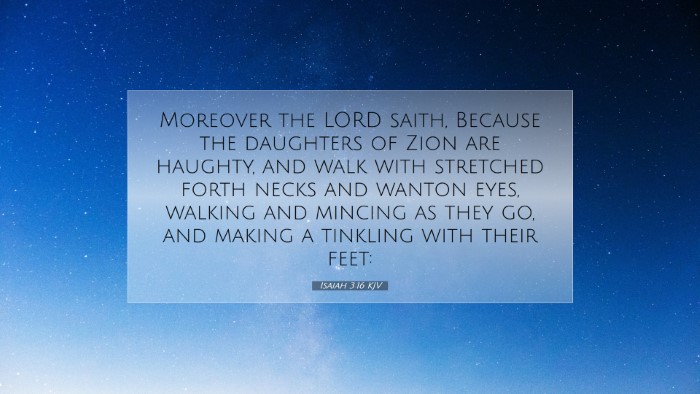Commentary on Isaiah 3:16
Verse Context: Isaiah 3:16 reads: "Moreover the LORD said, Because the daughters of Zion are haughty, and walk with stretched forth necks and wanton eyes, walking and mincing as they go, and making a tinkling with their feet."
Introduction
Isaiah 3:16 provides a profound insight into the social and moral decay in Judah, particularly addressing the daughters of Zion. This verse is a striking critique of pride and vanity that leads to a downfall both personally and nationally. The insights drawn from public domain commentaries can illuminate the spiritual truths and applications pertinent to both ancient and contemporary audiences.
Exegesis and Insights
The verse opens with the phrase, "Moreover the LORD said," emphasizing that this is a direct message from God regarding His observations of the people's behavior. This approach facilitates a deeper understanding of the significance of divine observation and judgment.
Divine Observation of Pride
Matthew Henry notes that God speaks against the "daughters of Zion" because their attitudes have become corrupted by pride and superficiality. He characterizes their behaviors as haughty and self-indulgent. This pride is contrasted with the humility that God desires from His people.
Haughty Behavior and Its Consequences
Albert Barnes elaborates that the "haughty" demeanor signifies not just a physical posture but reflects an inward condition. The imagery of "stretched forth necks" indicates arrogance and a defiant posture against God’s will. Barnes suggests that this behavior stems from a sense of entitlement, breeding a culture that prioritizes vanity over virtue.
Walking with Wanton Eyes
The phrase "wanton eyes" implies a sense of lewdness and moral laxity. Adam Clarke expounds that this indicates an allure towards worldly pleasures and distractions, seducing the heart away from godly devotion. The external expressions of this wantonness serve to highlight internal spiritual decay and signal a departure from righteousness.
Minced Steps and Tinkling Feet
The description of "walking and mincing as they go, and making a tinkling with their feet" paints a vivid picture of ostentatious display. Matthew Henry underscores that such flaunting of wealth and status is often distracting and serves as a destructive influence, both to themselves and their community. This "mincing" is contrasted with a life of purpose and genuine worship.
Theological Reflections
In examining Isaiah 3:16, we must consider the broader theological implications. The behaviors of the daughters of Zion reflect attitudes prevalent in humanity that resist divine order and moral commandments. Such attitudes lead not only to personal destruction but contribute negatively to communal integrity.
The Call for Repentance
Each commentary draws attention to the necessary response of repentance. Albert Barnes posits that awareness of one's pride and self-indulgence must precede genuine repentance. These observations serve as a foundation for pastoral engagement, encouraging communities to self-examine and realign towards humility and contrite hearts.
Lessons for Today’s Church
The implications of Isaiah 3:16 resonate powerfully within today's ecclesiastical context. Christians are called to discern how pride, vanity, and superficiality infiltrate their lives and churches:
- Self-examination: Individuals must consistently assess their motivations and behaviors while seeking to live a life reflective of humility and grace.
- Community Standards: Pastors and church leaders should cultivate an environment that emphasizes biblical virtues over external appearances.
- Repentance: The need for communal and personal repentance remains crucial in aligning with God's desires rather than societal trends.
Conclusion
Isaiah 3:16 serves as a poignant reminder of the dangers of pride and superficiality—both in ancient Judah and the modern Church. The insights derived from Matthew Henry, Albert Barnes, and Adam Clarke collectively reinforce the necessity of humility, the importance of moral integrity, and the call to repentance. As we reflect on these themes, may we aspire not to the vanities of life but to a deeper, more meaningful walk with our God.


